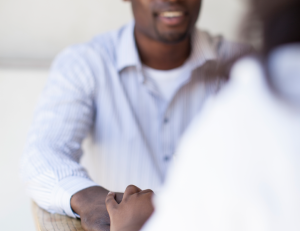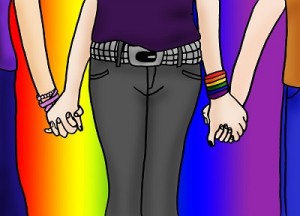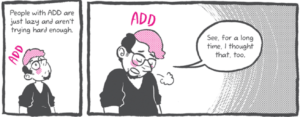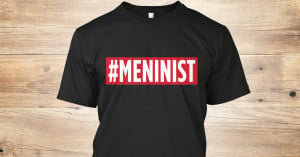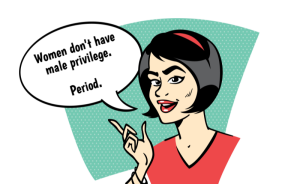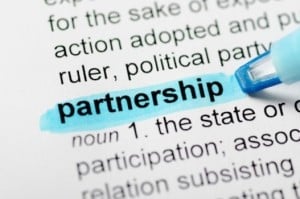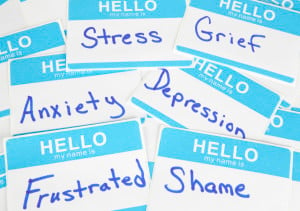My partner recently took me away to meet their grandparents for the first time. Swoon. It was a beautiful experience, and I felt very treasured.
It was also, however, a bit of a culture shock.
My partner, who is Black like me, has pretty conservative white grandparents. They warned me that their grandparents might say some things I didn’t like – and encouraged me to respond as authentically as I desired.
I replied, “Darling, please, you don’t even have to worry about me.” And I meant it.
The last thing I’m afraid of is a person boxed in by bigotry. Seriously. Every single person you know is, in some way, harboring some bigotry – even the person writing this essay (I promise I’m working on it).
We can’t really help it.
The very fabric of this society (and I’m writing from the Great US of A, by the way) sprouted from the seeds of colonization and slavery, and almost every ounce of media and legislation that’s emerged since has been rooted in protecting and sustaining, ever so covertly, the infrastructural remnants of those practices – especially the economic remnants.
But that doesn’t mean we all can’t learn, grow, change, and affect more change. That doesn’t mean we can’t heal. Folks with unchecked bigotry are just potential allies who need a little gentle (or stern – depending on their kink) unlearning. Such is the case with my boo’s grandparents.
While they were extremely pleasant and went out of their way to make me feel welcome in their home, it didn’t take long for the prejudice to seep out.
Their grandfather told us he could no longer join us for dinner because his body was in such intense pain after spending the whole day at the DMV, which quickly transformed into an angry tirade about how they would not replace his driving license because he didn’t have all the required identification materials.
I had a lot of compassion for his plight.
He is an old man with mobility struggles and walking from one side of the room to another is super painful for him. I can’t even imagine how frustrating it must have been to learn that all the work it took to get there – like getting into his car, driving to the DMV, getting out the car, standing in line, sitting down, getting back up when his number was called, and doing everything to get home again – was for naught.
Right as I was about to cluck at the frustrations of navigating an ableist system when you have a disability, he expanded on his complaints: “And I can’t believe they would treat me, an American citizen, with such disregard while they go out of their way to make things as easy as they possibly can for the illegals.”
Everyone sighed. My eyes bugged. He continued.
“The illegals come here, get licenses, take all our damn resources, get away with breaking all kinds of laws, and they treat me like shit. I served in the military. It’s not fair!”
Everyone shared another collective sigh. Eventually his wife was able to distract him from his xenophobic lament, and I held my tongue, completely torn.
I wanted to say something so badly! I wanted to tell him all the things that were horribly wrong about his statement. I wanted to help him understand what it’s really like to be an undocumented citizen in this country, especially an undocumented citizen who is a person of color, especially an undocumented citizen who is also Latinx.
I wanted to tell him about all the lives that are lost as a result of American imperialism, xenophobia, and militarism. I wanted to remind him that human is human, regardless of documentation or legalities, and that everyone should be treated with love and dignity.
But it was a slippery sort of situation I was in. The first time meeting the grandparents is a big deal. I desperately wanted them to like me. And—well—also, I was a weensy a bit intimidated.
As sweet as grandpa was to me, my boo had warned me that he had the tendency to be extremely disgruntled and uncompromising in an argument. And to keep it real, I got scared. I got really scared. And I hid behind that fear.
Even though I know it probably wouldn’t have changed his mind and thoughts in that moment (my partner has been talking to him about these things long before we were in each other’s lives), I wished I had the courage to be another person letting him know that his xenophobic words are hurtful and not acceptable.
I also have compassion for myself. Though I don’t want my fears to direct my choices, emotional safety is pretty damn important. Maybe that wasn’t the best time to have a hard conversation about xenophobia, racism, and American empire, and that’s okay.
There will be other opportunities to talk to him and people who think like him in the future, and next time I will be prepared.
So I decided to plot out what I would have done if I didn’t let fear get in the way. And since I work for a super popular feminist magazine, I decided to share that information with the rest of the world.
So, here is one way to lovingly and compassionately go about responding to the hella oppressive comments your sweetheart’s grandparent (or anyone, really) might say to you.
1. Assess Your Intentions
Perhaps you’re angry and hurt and frustrated and you just want to go off on the person. That’s absolutely fine.
Sometimes people need to be gone off on. They need to be told where the theatre is so that they can go find all the seats and sit down in them, over and over again, until they finally get it together.
People who make prejudiced comments need to know that there are very real consequences for their behavior, that if they’re going around harming folks with their violent and oppressive language, people will hold them accountable.
But it’s rare that that will actually change any one’s heart, mind, or behavior.
It usually just makes folks defensive, angry, and less likely to listen to you – especially if they don’t fully understand why they’re being told off.
We want these people to understand – really understand with all of their compassion – so that they can do the work to make change inside themselves and in all their privileged circles.
Which brings me to another option: Talk to them in a way in which they, coming from where ever they are coming from, might be open-hearted enough to really understand you.
This means talking to their heart, to the place that is hurt and holding on to all of that ignorance and misinformation as a way to help them navigate the pain and injustice they might be experiencing.
Systemic oppression is real.
And while it harms some of us waaaaaay more than it harms others, it pretty much harms us all.
Our goal is to help more privileged, but still oppressed folks realize that the violence and pain that they’re experiencing is a result of fucked up and exploitative institutions, not the already victimized people those institutions tell them to blame.
2. Go Straight to the Heart (And Acknowledge the Very Real Pain That Fueled Their Comment)
This is hard for a lot of people, especially folks who consistently and incessantly have to encounter prejudice and bigotry in the world.
That prejudice often has tangible consequences. When you’re struggling to survive and constantly being slammed with barriers to protect someone else’s privilege, the last thing you might want to do is try to be compassionate to the privileged person who’s sprouting some bullshit out the side of their neck.
I get it.
But there is a reason why that person is sprouting the bullshit. And if we truly want to change their mind and their behavior, we have to go the source: their hurt.
People want to know that they’re cared about. Just like we want them to hear us out and have compassion for our causes, we need to hear them out, too – not their bullshit, not their prejudice, but their more human part: the tender, trampled part that they are trying to comfort and validate with prejudice.
We need to show them something gentler and more honest than oppression – we need to show them some love. We have to validate their humanity and acknowledge their hurt.
In my partner’s grandfather’s situation, he just experienced some hardcore ableism and bureaucratic bullshit.
Because our society is deeply ableist and he doesn’t exist in circles that talk about those sorts of things, he doesn’t know that he deserves better from the institutions that are supposed to serve him.
So he took the easy (for a privileged white man) route out and started blaming a disenfranchised group – undocumented citizens. Before even mentioning what he said or did wrong, I should have immediately said something like:
- “Gosh, I can’t believe they don’t have scooters or wheelchairs for folks who need mobility assistance! That’s so ableist!”
- “Yikes, they didn’t ask you if you needed additional support! That’s so ableist!”
- Or: “Wow, they should have totally offered you some alternatives, given your situation! That’s so ableist!”
Then he, most likely, would have asked what ableism is and – booyow – what a great opening!
This way, I could bring him into the movement. I could show him how social justice and feminism is working to support him. I could introduce him to the idea of community and solidarity. He would get to feel welcomed and connected.
Perhaps a little stereotype he might have about feminists would be challenged. Maybe a little bit of his heart might open. And once he understood the extent to which folks are mobilizing for him, he might be slightly more open to mobilizing for others – or at least not saying messed up, inaccurate things about them.
3. Help Them Connect to Their Sense of Empathy
The critical key to helping a person feel compassion for anyone or anything is to help them identify some aspect of themselves in that situation.
For example, once I could sense that my love’s grandpa felt validated, valued, and cared for by both the movement and me – and that he fully understood how the system is working to marginalize him – that’s when I could help him recognize how that same system uses very similar tools to marginalize undocumented citizens.
I’d turn the tables. Only I’d do it very gently, very subtly, so that he felt like I was engaging him in a discussion – and not chastising him.
Because we’re not chastising. We’re teaching. We’re providing folks with the resources they need to grow and heal from all those patriarchal lies they were told.
Just like so many others did for us.
Because the moment we start calling people names (like racist, sexist, homophobe, bigot), even if that’s exactly what they are, we lose their trust and their ability to empathize. Most people usually don’t see themselves as oppressive monsters, and they don’t want other folks to see them that way either.
And that is critical to how oppression is sustained. We’re taught to identify people as oppressors, not systems. We’re taught to dismantle and destroy other people, not the institutions that facilitate arbitrary privilege and discrimination.
This teaches us to recognize each other as innate enemies. And that’s a problem.
It’s damn near impossible to reach hearts, to establish empathy, and to change minds across enemy lines. We’re taught that the only way to change an enemy’s behavior is to conquer them.
But in order to help someone shift their oppressive, bigoted values – especially someone that we love and want to build family with – we need to support them in finding liberation from the system’s brainwashing, not to conquer them.
It’s not my job to tell my partner’s grandpa that he is a xenophobe. It’s my job to help him understand what xenophobia is, how it shows up in our system (and consequently, our actions), and to let him connect the dots. He can. I sure bet you’ve done it before.
Help folks understand why they have those oppressive thoughts and where they came from so they can eradicate it inside themselves.
Change is a choice. And sometimes, we need to have faith that – given all the emotional and intellectual resources available –folks will make a loving choice.
I bet you’re thinking “This is pretty strategic, JDX.”
And I would absolutely agree.
But so is each and every form of oppression out there. They’re all rooted in very intentional strategy to sustain systemic power, privilege, and oppression. And they’re hurting us all.
Strategy and intentionality can be fine things. We apply them to business, money, raising families, and political campaigns.
Why can’t we use them when trying to compassionately connect to our loved one’s struggling with bigoted attitudes? Why can’t we use it to eradicate everyday oppression? Why can’t we use them to help us practice love under difficult circumstances?
That’s my plan.
My boo-thang’s grandpa is not going to have any idea what to do with the new feminist in the family.
Just kidding. He’s going to love me.
[do_widget id=”text-101″]
Vanessa Rochelle Lewis is the Senior Editor at Everyday Feminism. She is a queer, lush-bodied, Black, femme performance artist, writer, actress, educator, and Faerie Princess Mermaid Gangsta for the Revolution. She loves romantic songs, romantic films, romantic books, romantic conversations, romantic friendships, and writing long, vulnerable Facebook statuses (about romance). Speaking of Facebook, please add her here.
Search our 3000+ articles!
Read our articles about:
Our online racial justice training
Used by hundreds of universities, non-profits, and businesses.
Click to learn more


